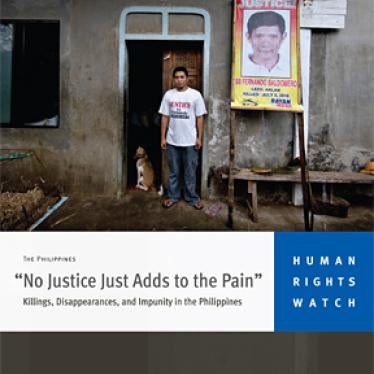Raul M. Bacalzo
Director General, Philippine National Police
Office of the Chief PNP
Camp Crame, Quezon City
Metro Manila 1111
The Philippines
Via facsimile: +632 724 8763
Re: Alleged extrajudicial killings and abductions (enforced disappearances)
Dear Director General Bacalzo,
I am writing to solicit your views for our research on extrajudicial killings and enforced disappearances in the Philippines, particularly those occurring since June 30, 2010.
Human Rights Watch is a nongovernmental organization based in New York that monitors violations of human rights by states and non-state actors in more than 80 countries around the world.
Human Rights Watch is committed to producing material that is well-informed and objective. We hope you and your staff would be able to answer the attached questions so that your views are accurately reflected in our reporting. In order for us to take your answers into account in our forthcoming report, we would appreciate a written response by June 24, 2011.
In addition, I will be visiting Manila in the coming months and would greatly appreciate meeting with you. My colleague will follow up with a formal request for a meeting once my travel dates are confirmed.
Please send your reply by email or fax to:
Diana Parker, Asia Associate
Human Rights Watch
1630 Connecticut Avenue, NW, Suite 500
Washington, DC 20009 USA
parkerd@hrw.org
+1-202-612-4333 (fax)
Thank you very much.
Sincerely,
Elaine Pearson
Deputy Director
Asia Division
Questions for Director General Bacalzo
1. What challenges does the Philippine National Police (PNP) face in investigating killings and abductions in which military personnel are implicated? How are these challenges being overcome?
2. How many extrajudicial killings or enforced disappearances has Task Force Usig investigated since June 30, 2010? Please provide a list, including the status of the investigation.
3. At what stage does the PNP consider a case "solved?"
4. What steps are taken to provide witnesses with accurate, complete information about the witness protection program at the earliest possible stage? Are there any standards regarding what police officers should tell witnesses about witness protection and at what stage of the investigation they should provide this information?
5. What is the routine process within the PNP for receiving and executing arrest warrants? What is the process when the subject of the arrest warrant is a member of the Armed Forces of the Philippines (AFP)?
6. What steps are being taken to ensure that police investigators continue their investigations until all suspects have been identified? In several cases that Human Rights Watch has investigated, the police investigators had ceased their investigation after only one or two suspects had been identified, and were not working to identify people who ordered the killings. In one instance, a police officer suggested that continuing to investigate a killing after a case had been filed would violate the sub judice rule-a rule that prevents people from commenting on the outcome of a case while it is before the court.
7. Has the Inspector General, the Provost Marshal, or any other investigating body within the PNP investigated police officers for inadequately investigating an alleged military abuse? If so, please provide details of the investigation and findings.
8. How many members of the PNP in the last five years have been disciplined or prosecuted for failing to adequately investigate alleged military involvement in a killing, abduction, or other serious crime? Please provide information on specific cases.
9. What steps have police investigators taken in relation to the June 14, 2010 killing of Benjamin Bayles in Himamaylan City, Negros Occidental, to establish whether the accused are members of the AFP? What steps have police investigators taken to identify who ordered the killing?
10. Why did the PNP withdraw police protection from the family of Fernando Baldomero, who was killed on July 5, 2010, in Barangay Estancia, Kalibo, Aklan, in April 2011? What has the PNP done to protect the Baldomero family-including the key witnesses-since this withdrawal of police protection?
11. Please provide information regarding the status of PNP investigations into the following cases of alleged extrajudicial killings and enforced disappearances. For each case, please advise what the investigation has involved, the status of the investigation, and any challenges faced. Please provide any investigation reports or other relevant documents. In cases in which arrest warrants have been issued, please advise the status of the arrest warrant and any challenges faced in executing the arrest warrants. For investigations that have been suspended or discontinued, kindly provide the reasons for the suspension or discontinuation.
List of cases
1. The killing of Benjamin Bayles on June 14, 2010, in Himamaylan City, Negros Occidental
2. The killing of Fernando "Nanding" Baldomero on July 5, 2010 in Barangay Estancia, Kalibo, Aklan
3. The killing of Pascual Guevarra on July 9, 2010, in Barangay San Isidro, Laur, Nueva Ecija
4. The killing of Julius Tamondez on August 12, 2010, in Paquibato District, Davao City
5. The abduction and "disappearance" of Agustito Ladera and Renato Deliguer in late August or early September, 2010, in Barangay Mahaba, Marihatag, Surigao del Sur
6. The killing of Reynaldo "Naldo" L. Labrador on September 3, 2010, in Paquibato Proper, Paquibato District, Davao City
7. The killing of Vicente Felisilda on September 9, 2010, in Mawab, Compestela Valley
8. The killing of Rene "Toto" Quirante on September 30, 2010, in Barangay Trinidad, Guihulngan, Negros Oriental
9. The killing of Ireneo "Rene" Rodriguez on November 7, 2010, in Balayan town, Batangas
10. The killing of Carlo "Caloy" Rodriguez on November 12, 2010, in Calamba City, Laguna
11. The abduction and "disappearance" of Alfredo Bukal on November 10, 2010, in Barangay Lutal, Tuy, Batangas
12. The killing of Rudy and Rudyric Dejos on February 27, 2011, in Santa Cruz, Davao del Sur







